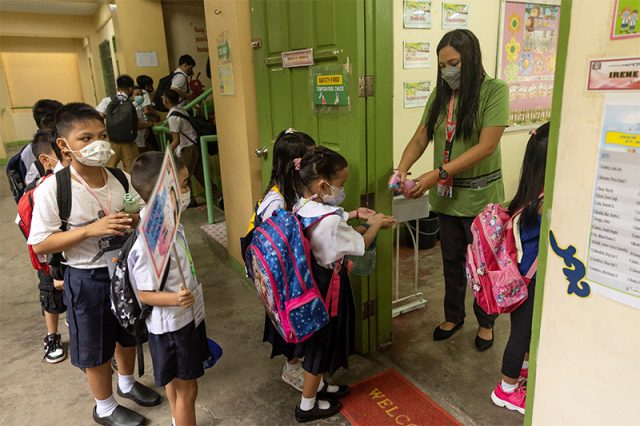
Positions were raised against a fellow of an independent pandemic monitoring group who claimed that masking “is not as effective” as the country continues to deal with the COVID-19 pandemic.
Fr. Nicanor Austriaco, a priest and molecular biologist of the OCTA Research Group, called for the dropping of the face mask mandate among students as face-to-face classes partially resumed last August.
“Our children have suffered for two years, they’ve been locked down—nearly one of the longest in the whole world of a lockdown—without school,” he said in an online forum on Tuesday.
“We must move from mask-to-mask to real face-to-face for our children. And since the data shows that masking is not as effective, we should be willing to move there as soon as possible for the sake of our children,” Austriaco added.
“Mask can prevent individual spread, but are less effective at preventing population spread,” he claimed.
Another OCTA Research fellow, Guido David, pointed out that Singapore and South Korea have already eased their face mask mandates.
But these countries have high COVID-19 vaccination rates, he added.
Meanwhile, Austriaco’s comments alarmed some Filipinos who thought it to be “irresponsible.”
“I have never seen so much irresponsibility from one research group,” a Twitter user said in response to the molecular biologist.
“Austriaco had previously claimed that the #OmicronVariant was a ‘blessing.’ Now, he’s seeding anti-masker sentiment,” another online user wrote, adding the hashtags “#CovidIsNotOver” and “#WearAMask.”
“Anyone who professes to be concerned about children amid this pandemic should understand the risks of #LongCovid, among others,” the social media user continued.
Another Filipino social media user reminded Austriaco that COVID-19 can be spread by aerosols containing viral particles.
“Fr. Nic, why? Masking is effective po since we are dealing with an airborne disease, especially in crowded and enclosed spaces,” the Twitter user said.
Physician Tony Leachon, former special adviser to the National Task Force Against COVID-19, also shared his two cents on the matter.
“The government has just issued an EO [Executive Order] liberalizing face mask outdoors. The children are the last to be vaccinated,” he tweeted, referring to President Ferdinand Marcos Jr’s Executive Order No.3 which eases face mask use outdoors.
“They should wear face masks to protect themselves. We should be cautious since we will only know the impact of this EO in 2-4 weeks. Haste makes waste,” Leachon continued.
The government on Monday allowed the voluntary removal of face masks in outdoor settings that are non-crowded and have good ventilation.
The easing comes amid concerns about the country’s low booster coverage and worries that some might not follow minimum public health protocols, which include proper cough etiquette.
As of Monday, the health department said that while more than 72.7 million Filipinos are already fully vaccinated, only 18.5 million have received booster shots.
The easing of the mask mandate also comes as the OCTA Research reported a “slow uptick” of COVID-19 cases in Metro Manila as of Sunday.
The group said that it saw an increase in the virus’ reproductive rate in the capital region, from 0.93 on August 31 to 1.11 on September 7.
The reproduction number indicates the number of people that can be infected by a COVID-19 patient. A figure greater than one notes that “infections are increasing,” according to Guido.
Masking is effective
Experts from the global community have learned that wearing a face mask and strictly practicing physical distancing measures can limit the virus’ transmission, which can be spread through respiratory droplets or aerosols containing viral particles.
“A review funded by the World Health Organization and published in the scientific journal Lancet earlier this month concluded staying at least three feet from others and wearing face masks does appear to limit the transmission of the coronavirus,” a 2020 article from The Washington Post read.
Researchers led by a Texas A&M University professor believe that wearing a face mask in public “corresponds to the most effective means to prevent inter-human transmission.”
“Our study establishes very clearly that using a face mask is not only useful to prevent infected coughing droplets from reaching uninfected persons, but is also crucial for these uninfected persons to avoid breathing the minute atmospheric particles (aerosols) that infected people emit when talking and that can remain in the atmosphere tens of minutes and can travel tens of feet,” Mario Molina said, as quoted by Science Daily.









